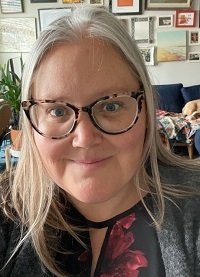Amy Townsend-Small is an Earth and environmental scientist who studies the interactions of human activities with global cycles of carbon, nitrogen, and water. Together with collaborators, she has raised more than $2 million in research funding and published more than 40 peer-reviewed scientific articles. Her recent work includes investigations of the feedbacks of climate warming on greenhouse gas emissions from lakes and Arctic permafrost systems; changes in river and stream chemistry and water flow due to changing weather and other impacts; and environmental impacts of energy production, primarily oil and gas extraction. She was the first researcher to publish the groundbreaking results that methane emissions from natural gas systems were higher than previously reported in an American city (Los Angeles). This discovery, at the onset of the oil and gas boom in 2012, led to the development of a new research effort to constrain methane emissions from the natural gas supply chain as the United States became the world leader in oil and gas production. A service-driven researcher, she has collaborated with community groups, the energy industry, nonprofits, and government as the need for rapid global action on greenhouse gas emissions has become manifestly clear. In early March 2020, she was selected as a Fulbright Public Policy Fellow to help develop policies for greenhouse gas emissions reduction and sustainable development, in pursuit of both the Paris Agreement and United Nations Sustainable Development goals. She led a community engaged research project to provide groundwater testing and scientific information to residents of fracking areas in her home state of Ohio, for which she was awarded the Science and Community Award by the Ohio Environmental Council. She also collaborated with environmental justice communities in Louisville, Kentucky through the American Geophysical Union. She recently served for a year with AmeriCorps, mentoring young Americans seeking to improve their lives through service while assisting disaster victims and those most affected by the COVID-19 pandemic throughout the eastern and southern US. For this year of service, she was awarded the President’s Volunteer Service Award by The White House in September 2020: this is our nation’s highest award for volunteer service. Her expertise has been sought by international scientists and diplomats struggling with energy transitions in their own countries, including from Germany, India, and Japan, through the Department of State International Visitors Program. She works with the United States Environmental Protection Agency and the Intergovernmental Panel on Climate Change as part of the United Nations Framework Convention on Climate Change treaty to improve our greenhouse gas emissions inventory for the United States and other countries. Her research informed the development of the Clean Power Plan, which formed the backbone of the United States’ plan to adhere to the Paris Agreement. Specifically, the Clean Power Plan would have limited methane emissions from natural gas systems as electricity production in the US transitioned from coal to natural gas. She now works with state and federal policymakers to strengthen regulations on greenhouse gas emissions to renew our commitment to the Paris Agreement, and with the City of Cincinnati to enact local climate policy.
Department of State Profile
Bureau of Near Eastern Affairs
Office of Regional and Multilateral Affairs
Amy serves in the Bureau of Near Eastern Affairs (NEA) in the Office of Regional and Multilateral Affairs (RMA), which serves as the “think tank” of the Bureau. She works on a variety of projects in the areas of health, energy, water resources, and greenhouse gas emissions mitigation. She serves as the bureau’s point of contact for issues related to the COVID-19 pandemic, particularly vaccine diplomacy. She and her counterparts at other regional bureaus and at embassies worldwide are working to increase the COVID-19 vaccination rate, and also to encourage all countries to work together toward vaccination goals. This team is also organizing global meetings of heads of state to discuss paths toward ending the pandemic in 2022. Amy also works with the office of the Special Presidential Envoy for Climate and the Bureau of Oceans and International Environmental and Scientific Affairs on helping Middle East and North African countries strengthen their Nationally Determined Contributions to the Paris Agreement, and in joining and meeting their goals in the Global Methane Pledge. She also works on providing scientific and educational solutions to water scarcity issues in the region, which is already experiencing political instability due to drought. Finally, she is working on helping Middle Eastern and North African countries that are dependent on oil and gas production prepare to transition their economies and educational systems to a renewable energy future.
|




